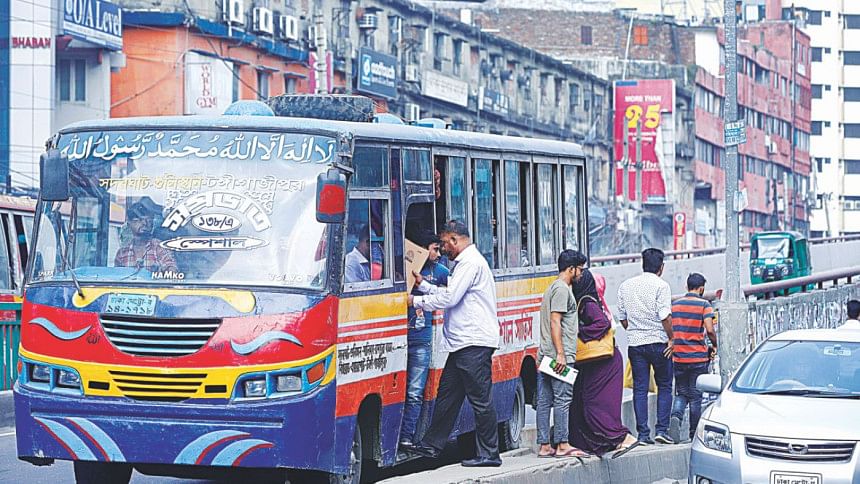Roads, just like before

Bangladesh is going to observe the National Road Safety Day today with the slogan “Will obey law; will make roads safe” against the backdrop of an unprecedented student agitation for safe roads.
Different government and non-government organisations have chalked out elaborate programmes to mark the day, an initiative of prominent road safety campaigner Ilias Kanchan which the government turned into a national campaign last year.
Since the agitation, sparked by the deaths of two college students on July 29 and resulting in school-goers taking to the streets demanding road safety, nothing meaningful has happened.
Three months after the agitation began, Dhaka's traffic system seems to have gone back to chaos, except for some minor changes including use of helmets by bike riders and pillions.

Haphazard pick-up and drop-off by buses, their racing on streets, jaywalking, commuters' reluctance to follow traffic rules, and rampant plying of slow-moving three-wheelers on the highways are all back.
Casualties on the roads have meanwhile kept on rising. At least 713 people were killed and 2,068 injured in 667 accidents in August and September, according to the National Committee to Protect Shipping, Roads and Railways.
After the student agitation, police, supported by volunteers including Rover Scouts, first observed a 10-day Traffic Week. The Dhaka Metropolitan Police (DMP) enforced a month-long traffic safety awareness campaign in September and filed around 1.7 lakh cases for traffic rules violations and realised around Tk 14 crore in fines.
But after the month-long campaign, DMP Commissioner Asaduzzaman Mia said their “sincere attempts” could not yield the expected results due to people's tendency to violate traffic rules.
Visiting different areas in Dhaka over the last two days, this correspondent found that doors of most buses were not closed and they were not stopping at dedicated places, violations of the directives issued by the Prime Minister's Office.
Buses are stilling operating on daily contract basis, a system blamed for unhealthy competition and street races for passengers, even though transport leaders vowed to stop this practice.
“Even after our steps, still 20 to 30 percent buses are operating on contract basis,” a transport leader said asking not to be named.
During a recent visit to Dhaka-Aricha, Dhaka-Barishal and Dhaka-Khulna highways, this correspondent found slow-moving vehicles plying on highways flouting a government ban.
Kanchan, however, was optimistic. He said this year's slogan is “very significant”.
“Because, if we do not obey the law, discipline will not prevail on the streets,” Kanchan, chairman of Nirapad Sarak Chai movement, said.
The student agitation showed that people, alongside many dignitaries, do not follow the traffic laws. “So, everybody -- vehicle owners, drivers, passengers and pedestrians -- must obey the law,” he added.
He blamed poor or no implementation of different government directives and poor monitoring for the return of the chaos on streets.
Noted transport expert Prof Moazzem Hossain said any ad-hoc steps would not bring major changes.
Fundamental and structural changes are necessary for the transport sector, but the government, instead of doing so, has taken some steps following the student movement using law enforcers.
“But, enforcement of law is one of the several elements … only enforcement will not bring any sustainable change in this sector,” he observed.
Nazrul Islam, secretary to the Road Transport and Highway Division, however, said there might not have been “drastic changes” but changes are there.
“The government has taken many steps taking people's concerns about road safety into consideration and the work is underway,” he said.
Asked about non-implementation of directives, he said many stakeholders are involved and if all are sincere, it is possible to implement those.
During visits, an unusually large number of people were seen at the offices of Bangladesh Road Transport Authority (BRTA) to either collect or regularise their documents.

 For all latest news, follow The Daily Star's Google News channel.
For all latest news, follow The Daily Star's Google News channel. 



Comments